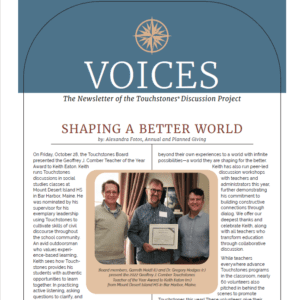
Early this year, the Mt. Desert Island Regional School System (MDIRSS) contacted Touchstones. They wanted to take a great step forward for their students and community by implementing a district-wide civics program. And they wanted Touchstones to be a core part of their new curriculum. When the pandemic struck, even the best laid plans of in-person workshops evaporated. However, persistence from the dedicated leaders at MDIRSS ensured their evolving civics program moved forward. They are launching it even as they begin this school year remotely. By the time you read this, many of their middle and high school students will already have started exploring the central role of civil discourse in American civics.
As part of the district’s preparation, Touchstones engaged more than 20 MDIRSS educators in two days of online professional development in mid-June. As Julie Melzer, Director of Curriculum, Assessment, and Instruction and Title IX Coordinator, wrote afterward, “[The] facilitation was excellent. [Their] calm demeanor and articulate responses to all questions was impressive. I’m looking forward to working with them throughout the coming year.” To ensure teachers were fully ready to implement online, the same group then spent a day in August participating in model classes. The middle school teachers participated first in Lesson 1, as high school teachers observed. Then the teachers swapped virtual seats and roles, to experience both the Touchstones discussion class and role of observer. In the afternoon, we used the same format as both groups participated in Lesson 2 of their respective volumes. After each session, the teachers—participants and observers alike—discussed and evaluated the modeling. Because most virtual classes in the district will include 12-15 students, the teachers will use a similar approach within their own classes of students.
The teachers’ feedback afterward made clear how valuable the observer and participant structure can be to seeing how Touchstones works—how it deliberately addresses student interaction and outcomes. As one teacher reported, “It was wonderful to investigate and try out a genuine cooperative learning approach, which really does help eliminate anxiety, fear of speaking, or fears of not being heard. I’ve never experienced a workshop like this, and I can’t wait to begin with students in the fall.”
The COVID-19 pandemic has pushed the world into unpredictable and unexpected situations. Months into this crisis, it is still unclear what a return to “normal” will entail. Though many professional exchanges previously straddled the physical and digital worlds, it’s clear now that education must prepare students with highly effective communication, collaboration, and leadership skills in both environments. MDIRSS’s choice of Touchstones for their teachers and students promotes the longstanding value of civics-centered education while reinforcing the centrality of civil and inclusive discourse in our democracy.



 Join the
Join the